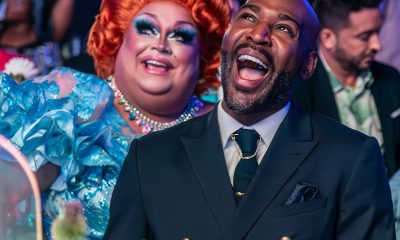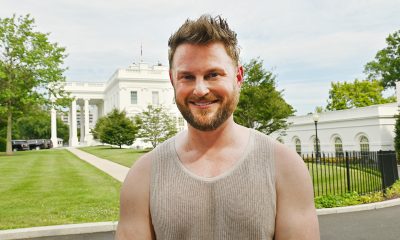Arts & Entertainment
‘Queer Eye’ star Tan France accuses TSA of racial profiling him
The fashion expert called out the administration for its extra security checks
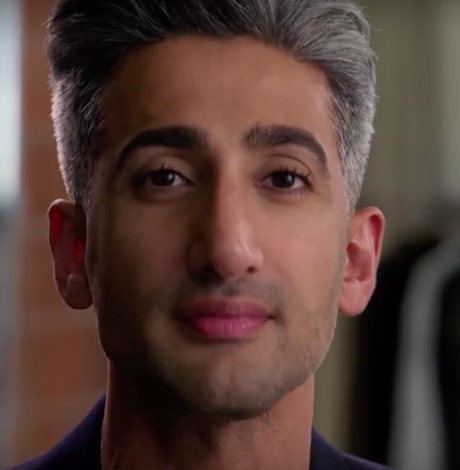
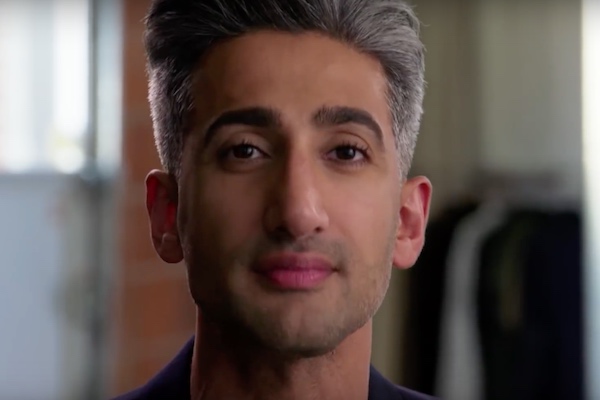
Tan France (Screenshot via YouTube)
“Queer Eye” star Tan France blasted TSA for having him “put through extra security checks 3 times this week” even though he says he has TSA pre-check.
France, who is Pakistani, posted on Twitter that a TSA agent informed him that he kept getting extra security checks because his name “is on a list.”
“I’ve been put through extra security checks 3 times this week, and was just told by a TSA agent it’s because my name is on a list,” he tweeted. “WTF? I’m brown but that does NOT mean I’m a damn security risk!!!” He added: “Because I know the answer. I know why I’m being profiled.”
@TSA I’ve been put through extra security checks 3 times this week, and was just told by a TSA agent it’s because my name is on a list. WTF? I’m brown but that does NOT mean I’m a damn security risk!!!
— Tan France (@tanfrance) December 12, 2018
TSA responded to France’s comment on Twitter posting “We’re sorry to hear this. DHS TRIP can provide resolution to travelers with difficulties getting through security and inspection at airport checkpoints.”
We’re sorry to hear this. DHS TRIP can provide resolution to travelers with difficulties getting through security and inspection at airport checkpoints. To learn more, please visit: https://t.co/nRPMSw7Xr6
— AskTSA (@AskTSA) December 12, 2018
According to the Daily Mail, France continued the discussion on his Instagram Story.
“I’ve just gone through security at the airport, it took me over two hours. And this is now the third time this week,” France posted. “What happens is when you’re checking in, they tell you that you can’t use your pre-check because there’s a security issue. At that point they take you out of line, and then they search you, and they give you a pat down—which is humiliating—where they check everything. And then they go through all your bags – and they take a good 45 minutes to go through your bag.
“So the reason why I wanted to post this is so I can tag TSA and hopefully they’ll see this at some point and figure out why the f**k they’re treating me like this. Because I know the answer. I know why I’m being profiled,” he continued.
TSA issued a statement to E! News about the situation saying: “All airline passengers, regardless of race, gender, or religion, are thoroughly screened at airport screening checkpoints. TSA cannot comment on the security designation for specific individuals, and there are a number of reasons a passenger can be selected for additional screening, including by random designation.”
Photos
PHOTOS: Independence Day Weekend in Rehoboth
Wicked Green Pool Party, fireworks among festivities

Vacationers and residents alike enjoyed Independence Day Weekend activities in Rehoboth Beach, Del. The Wicked Green Pool Party drew hundreds to the CAMP Rehoboth fundraiser on Saturday. That evening, revelers went to the rooftops to watch the fireworks display.
(Washington Blade photos by Daniel Truitt)













Music & Concerts
Red, White, and Beyoncé: Queen Bey takes Cowboy Carter to D.C. for the Fourth of July
The legendary music icon performed on July 4 and 7 to a nearly sold-out Northwest Stadium.

Just in time for Independence Day, Beyoncé lit up Landover’s Commanders Field (formerly FedEx Field) with fireworks and fiery patriotism, bringing her deeply moving and genre-defying “Cowboy Carter” tour to the Washington, D.C. area.
The tour, which takes the global icon across nine cities in support of her chart-topping and Grammy-winning country album “Cowboy Carter,” landed in Prince George’s County, Maryland, over the Fourth of July weekend. From the moment Beyoncé stepped on stage, it was clear this was more than just a concert — it was a reclamation.
Drawing from classic Americana, sharp political commentary, and a reimagined vision of country music, the show served as a powerful reminder of how Black Americans — especially Black women — have long been overlooked in spaces they helped create. “Cowboy Carter” released in March 2024, is the second act in Beyoncé’s genre-traversing trilogy. With it, she became the first Black woman to win a Grammy for Best Country Album and also took home the coveted Album of the Year.
The record examines the Black American experience through the lens of country music, grappling with the tension between the mythology of the American Dream and the lived realities of those historically excluded from it. That theme comes alive in the show’s opening number, “American Requiem,” where Beyoncé sings:
“Said I wouldn’t saddle up, but
If that ain’t country, tell me, what is?
Plant my bare feet on solid ground for years
They don’t, don’t know how hard I had to fight for this
When I sing my song…”
Throughout the performance, Beyoncé incorporated arresting visuals: Black cowboys on horseback, vintage American iconography, and Fox News clips criticizing her genre shift — all woven together with voiceovers from country legends like Dolly Parton and Willie Nelson. The result was a multimedia masterclass in storytelling and subversion.
The “Cowboy Carter” tour has been a social media sensation for weeks, with fans scrambling for tickets, curating elaborate “cowboy couture” outfits, and tailgating under the summer sun. At Commanders Field, thousands waited in long lines for exclusive merch and even longer ones to enter the stadium — a pilgrimage that, for many, felt more like attending church than a concert.
One group out in full force for the concert was Black queer men — some rocking “denim on denim on denim on denim,” while others opted for more polished Cowboy Couture looks. The celebration of Black identity within Americana was ever-present, making the concert feel like the world’s biggest gay country-western club.
A standout moment of the night was the appearance of Beyoncé’s 13-year-old daughter, Blue Ivy Carter. Commanding the stage with poise and power, she matched the intensity and choreography of her mother and the professional dancers — a remarkable feat for someone her age and a clear sign that the Carter legacy continues to shine.
It’s been nearly two decades since Beyoncé and Destiny’s Child parted ways, and since then, she’s more than lived up to her title as the voice of a generation. With “Cowboy Carter,” she’s not just making music — she’s rewriting history and reclaiming the space Black artists have always deserved in the country canon.
a&e features
From Prohibition to Pride: Queering the District podcast reveals local LGBTQ history
The new podcast explores the hidden history and enduring impact of queer spaces in Washington, D.C.
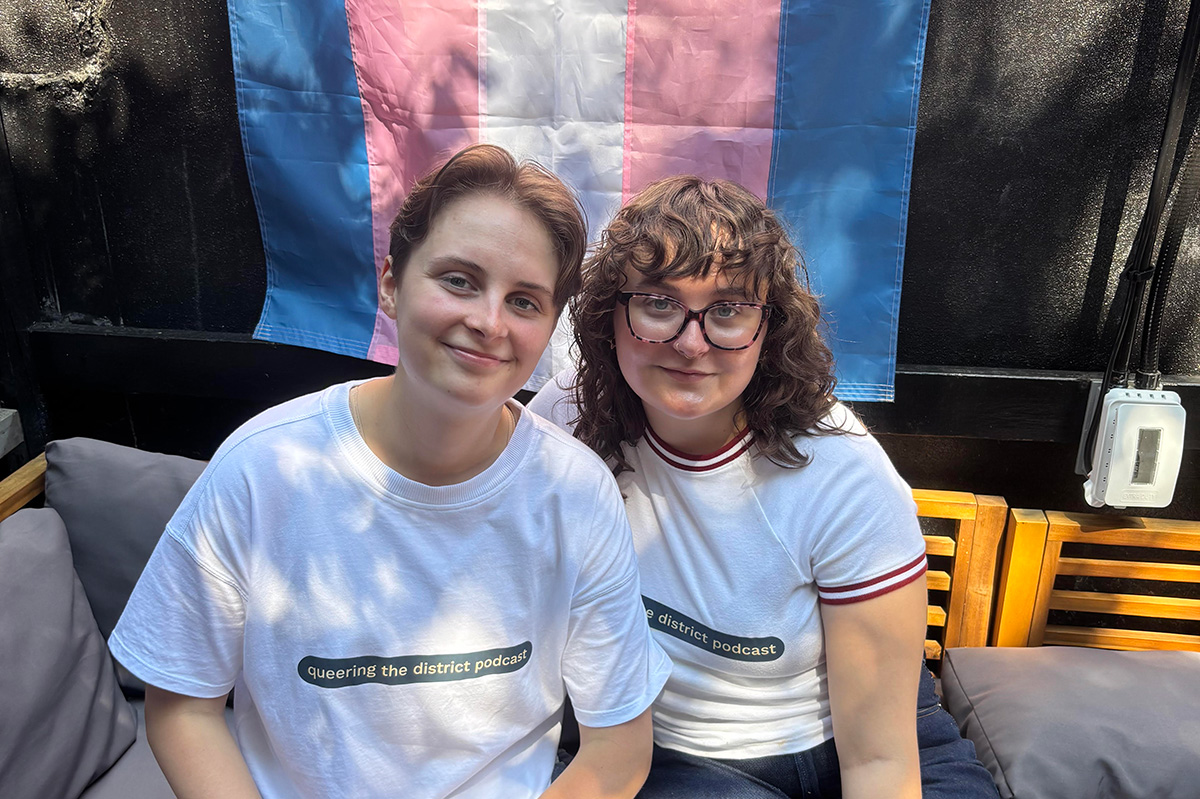
On June 25, as Pride month inched toward its end, three queer creators launched an ambitious project to honor the spaces that built D.C.’s LGBTQ community—and connect them to today’s queer life. The first episode of their podcast, Queering the District, hit streaming platforms that day, aiming to spotlight what host and co-creator Abby Stuckrath calls “third places”: bars, clubs, and gathering spots that have served as hubs for queer life across the city.
Each episode of the 10-part series delves into a different piece of D.C.’s queer past—from landmark clubs to untold personal stories—told through the voices of drag legends, activists, DJs, historians, and patrons who lived it. The show also threads together personal experiences from today’s community, bringing the listener on an auditory journey from Prohibition-era speakeasies to contemporary nights out at places like As You Are or Saints & Sinners.
Abby Stuckrath, alongside her sibling Ellie Stuckrath, and producer Mads Reagan, make up the podcast’s creative team. A recent journalism graduate of American University, Abby told the Blade that her passion for queer storytelling began during college—and that D.C. itself played a defining role in shaping her queer identity.
“I went to American University. I graduated last year and studied journalism. When I was in school, I always wanted to focus on queer stories – especially in D.C., because I’m from Denver, Colorado, I’ve never lived in a place like this before. D.C. has always just kind of been a place I call home when it comes to my queer identity.”
But breaking into the media to tell those stories wasn’t easy. Stuckrath quickly learned that editorial support—and funding—for queer-focused projects is limited. So she decided to do it her own way.
“I kind of found out that if you want to tell stories, you kind of have to do it on your own– especially when it comes to queer stories. There’s not a lot of people begging for us to talk about queer people and to pay you for it. So I was like, ‘Okay, let’s just do it on my own.’”
The idea for the podcast first took root in conversations with Ellie, Abby’s sibling and biggest supporter. Ellie had also moved to D.C. to find more space to explore and express their queer and gender identities. Together, the two began shaping a vision that would combine storytelling, sound design, and grassroots community input.
“I was like, ‘I don’t know what exactly I want to do yet, but I want it to be queer, and I want it to be about D.C., and it’s going to be called Queering the District, and we’re going to find out what that means.’ And Ellie is my biggest supporter, and my best friend. And they were like, ‘Hell yeah. Like, let’s do this.’ And so we decided to just do it together.”
The name stuck—and so did the mission. The team began researching queer D.C. history and found a city overflowing with stories that had rarely been documented, especially in mainstream archives.
“We started looking up the history of queer culture in D.C., and it kind of just clicked from there,” Stuckrath said. “I did not know anything about how rich our history is in the city until one Google search, and then I just kept learning more and more. I was kind of pissed because I studied gender studies in school in D.C. and didn’t learn shit about this.”
Season one focuses on the role of third places—non-work, non-home spaces where queer people could gather, exist fully, and build community.
“Third places have always been the epicenter of queer life… places outside of just your own personal home, because sometimes that isn’t a safe place. And of course, the work most commonly in the past and still today, isn’t a safe place for queer people to be full of themselves. So like, bars were the first place for queer people to really thrive and meet each other.”
To make the show participatory, Queering the District includes a twist: a voicemail line where anyone can call in and share a memory or question. The team calls the phone “Fifi”—a nod to the kind of retro guestbooks often used at weddings, but reimagined for queer nightlife and history.
“We wanted to find a way for people to share their stories with us anonymously… so even though we start in Prohibition, we wanted to connect it to now—like, those people who were singing jazz to each other in a white queer bar are connected to you singing karaoke on a Sunday night at your favorite gay bar. We’re all interconnected by this third place of queer bars in D.C.”
Those connections are emotional as well as historical. While building the series, one realization hit Stuckrath particularly hard: the immense loss of queer spaces in D.C., especially in neighborhoods that have since been heavily redeveloped.
“Every time I go to a Nats game, I think about, well, this just replaced five gay bars that used to be here. It used to be the home of Ziegfeld’s… Tracks, which was almost 2,000 square feet, with a volleyball court in the back, a fire pit, and iconic light show. I just didn’t know that we had that, and it made me sad for the queer elders that are in our city now who walk the streets and don’t see all those places they used to call home.”
That sense of loss—alongside the joy and resilience of queer community—is what the show aims to capture. As the podcast continues, Abby hopes it serves as both a celebration and an educational tool, especially for young LGBTQ people arriving in D.C. without realizing the queer foundations they’re walking on.
“D.C. is a unique city, and specifically young queer people who are hoping to move to the city—to know that you’ve got to know your history to be here. I hope this serves as an easier way for you to consume and learn about queer history, because queer history defines how we move in life.”
And for all the voices still left out, Abby is clear: this podcast is an open door, not a final word.
“This is a perfectly imperfect podcast. We should just be a starting point. We shouldn’t be the ending point.”
New episodes of Queering the District drop every Wednesday on all major platforms.
-

 Virginia2 days ago
Virginia2 days agoDefying trends, new LGBTQ center opens in rural Winchester, Va.
-

 South Africa5 days ago
South Africa5 days agoLesbian feminist becomes South African MP
-

 Travel3 days ago
Travel3 days agoManchester is vibrant tapestry of culture, history, and Pride
-

 Opinions3 days ago
Opinions3 days agoUSAID’s demise: America’s global betrayal of trust with LGBTQ people

